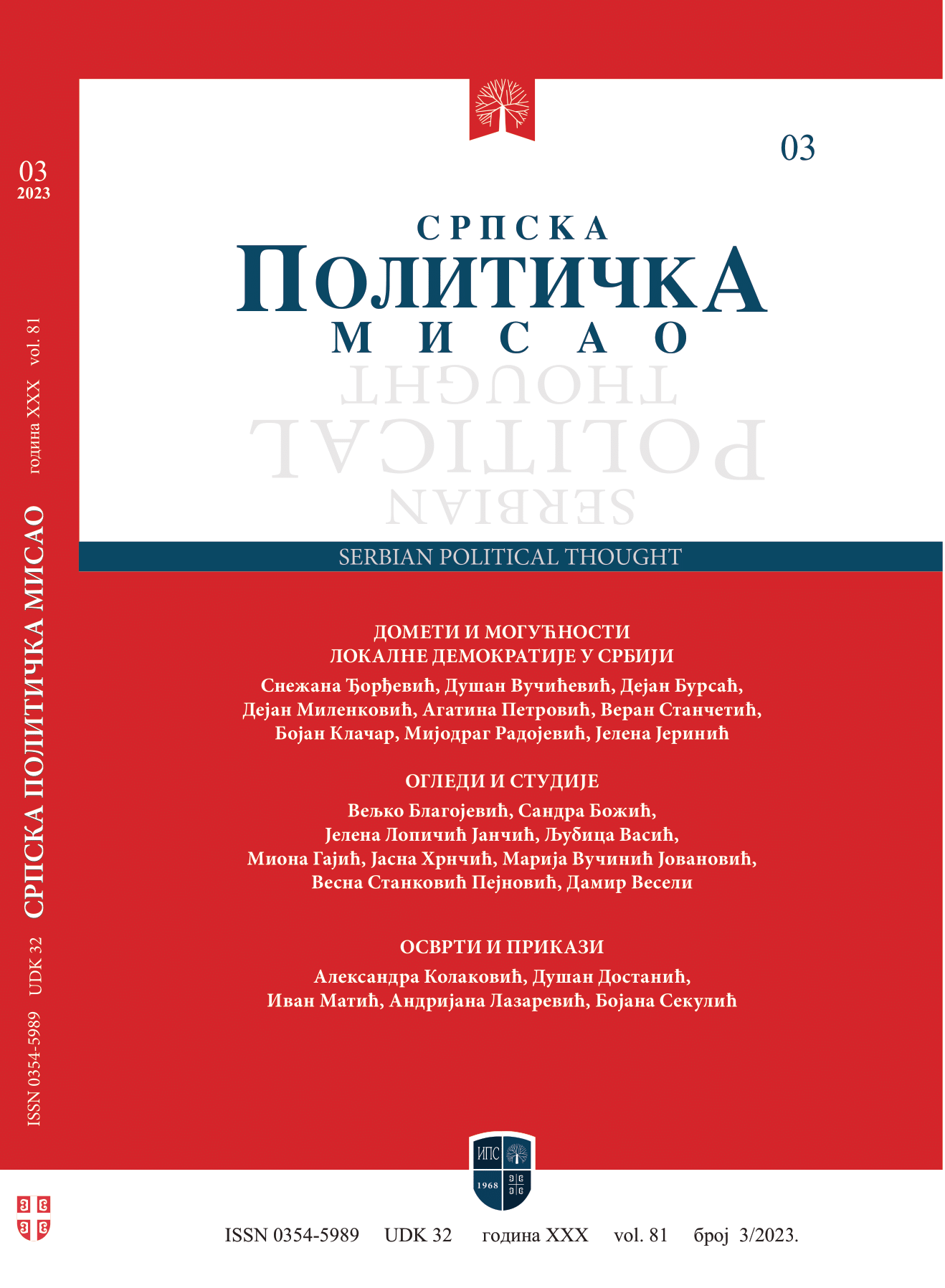Implementanation of IT in local public sector
Abstract
State and local governments in e-tools have important instruments of quality management and the creation and implementation of sectoral policies. Smart city projects provide excellent services to citizens, increase the transparency and accountability of authorities, as well as citizens' satisfaction with services.
Participative e- decision-making is useful because citizens are indispensable for expressing their needs, assessing the quality of services, and setting requests and initiatives (co-production). On the other hand, it is also important to include public servants who ensure that decisions are optimally shaped and that services are tailored according to the needs of specific people (personalization of services) and the community.
Serbia has a systemic problem of centralization, a top-down approach to management, weak participation of citizens and weak involvement of experts in the work of e-government. Good practice indicates that e-government cannot function without the active involvement of citizens, so our system needs to be changed and improved. These changes would also modernize management, decision making and policy making (evidence based decision and policy making). The consequence would be the creation of services according to the needs of citizens, which increases citizens' satisfaction with the quality of services. In addition, these processes strengthen the socialization of citizens, strengthen democratic capacities of communities, and raise the motivation of employees to contribute to the quality of work (strengthening of professionalization, motivation and dignity of public servants).References
Министаарство државне управе и локалне самоуправе. 2022. Програм развоја е-управе у РС за период од 2023 ди 2025 са акционим планом за његово спровођење, Београд.
Brandston, Taco and Victor Pestoff. 2008. The Third Sector and the Delivery of Public Services, London and New York: Routlede.
Caragliu, Andrea, Chiara Del Bo, and Peter Nijkamp. 2011. “Smart Cities in Europe”, Journal of Urban Technology 18 (2), 65-82. doi:10.1080/10630732.2011.601117
Cordella, Antonio, and Nicollo Tempini. 2011. E-Government and Bureaucracy: The Role of Functional Simplification in the Case of the Venice Municipality, Gov. Workshop 2011, West London: Brunel Univercity UB8 3PH
Curwell Steve, Mark Deaklin, Ian Cooper, Kressimira Paskaleva, 2005. Citizens’ Expectations of Infomation Cities: Implications for Urban Planning and Design, Building Research & Information, 33 (1). 55-66. Routledge. doi: 10.1080/0961321042000329422
de Boer Noortje and Nadine Raaphorst. 2021.”Automation and discretion: explaining the effect of automation on how street-level bureaucrats enforce” Public Management Review 25 (1): 42-62, doi: 10.1080/14719037.2021.1937684
Аутор. 2019 „Smart Policies and Innovative Services“in The Future of Cities, ed. Borislav Stojkov. 361-374. Beograd: Academy of Engineering sciences, BU, Faculty of Geography.
Аутор. 2021. „Digitalizacija koja podržava participativnu demokratiju i održivi razvoj“ u Građani u doba dezinformacija, ur. Aleksandra Krstić. 107-126, Beograd: UPNS, FPN.
Ersoy, Aksel. 2017. “Smart Cities as a Mechanism towards a broader Understanding of Infrastructure Interdependencies” Regional Studies, Regional Science 4:1, 26-31, April 2017. Oxford, UK: Rutledge. doi: 10.1080/21681376.2017.1281154
Fugini, Mariagrazia, Enrico Bracci, Mariafrancesca Sicilia Eds. 2016. Co-production in the Public Sector Experiences and Challenges. Milano: Politecnico di Milano, Springer.
Fung, Archon. 2004. Empowered Participation, Reinventing Urban Democracy, Princeton: Princeton University Press.
Osborne David and Ted Gaebler 1992. Re-Inventing Government. MA: Addison Wesley.
Ostrom, Elinor. 1999. „Crossing the great divide: coproduction, synergy and development“ in Polycentric Governance and Development, Readings from the Workshop in Political Theory and Policy Analysis, ed. M.D. McGinnis. Ann Arbor: University of Michigan Press.
Paletti, Andrea. 2016. „Co-production Through ICT in the Public Sector: When Citizens Reframe the Production of Public Services“ in Digitally Supported Innovation, Eds. Caporarello Leonardo, Fabrizio Cesaroni, Raphael Giesecke and Michele Missikoff. 141-152. Berlin: Springer. doi: 10.1007/978-3-319-40265-9
Pestoff, Victor. 2008. A Democratic Architecture for the Welfare State: Promoting citizen participation, the third sectora and coproduction, London, New York: Routledge
Pestoff, Victor. 2009. „Toward a Paradigm of Democratic Participation: Citizen Participation and Co-production of Personal Social Services in Sweden“ Annals of Public and Cooperative Ecoonomics 80 (2): 197–224, doi: 10.1111/j.1467-8292.2009.00384.x
Swiss PRO. 2019. Procena stanja elektronske uprave u jedinicama lokalne samouprave – Swiss PRO indeks razvoja e – uprave. Beograd: Swiss PRO, DCG, SDC, UNOPS, SKGO.
Schou, Jannick and Marten Hjelholt. 2018. Digitalization and Public Sector Transformation, Palgrave, Macmillan.
Thomann Eva, Nadine van Engen and Lars Tummers. 2018. “The Necessity of Discretion: A Behavioral Evaluation of Bottom-Up Implementation Theory” Journal of Public Administration Research and Theory 28 (4): 583–601, doi:10.1093/jopart/muy024
Tummers, Lars and Juliano Bekkers. 2014. Policy Implementation, Street-level Bureaucracy, and the Importance of Discretion, Public Management Review 16(4):527-547. doi:10.1080/14719037.2013.841978
Vamstad, Johan. 2012. „Co-production and Service Quality: The Case of Cooperative Childcare in Sweden” International Journal of Voluntary and Nonprofit Organizations 23 (4):1173–1188, doi:10.1007/s11266-012-9312-y

